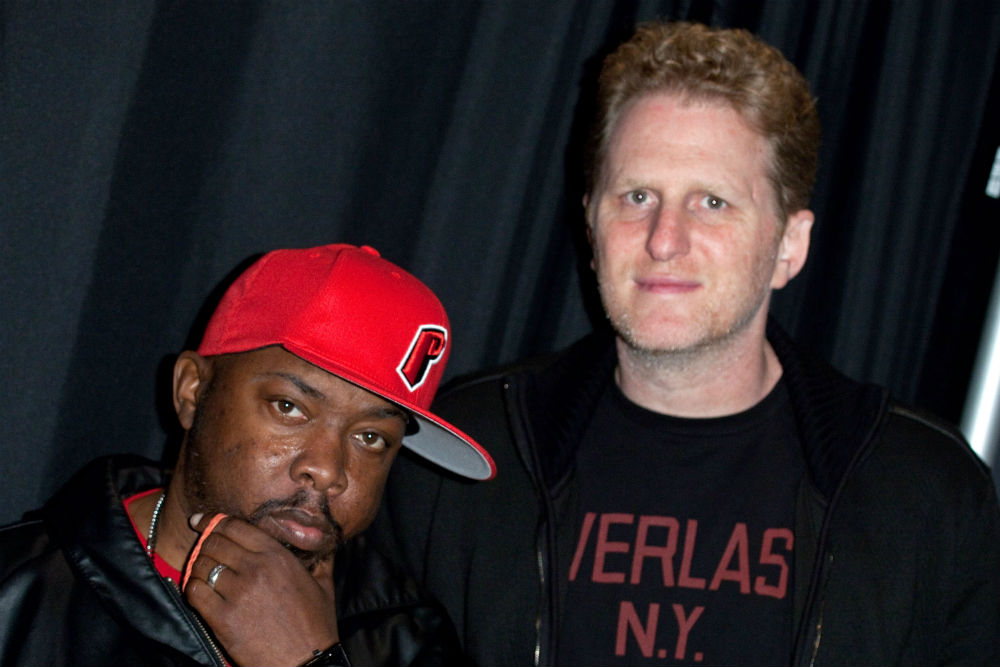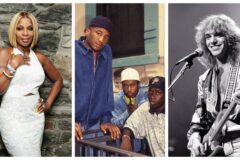A few minutes after I interview him over the phone, Michael Rapaport sends me the following text: “I’ll tell you this much / Riding on the train with no dough sucks… That was an honest line. That was excellence.” The 46-year-old actor and director is referring to a rhyme from the 1991 track “Buggin’ Out,” rapped by A Tribe Called Quest MC Malik “Phife Dawg” Taylor, who died at the age of 45 on Tuesday night due to complications from diabetes. Rapaport’s devotion to Tribe is well-documented, literally — the filmmaker helmed the definitive Tribe documentary, Beats, Rhymes & Life: The Travels of A Tribe Called Quest, which was released in 2011.
An engaging portrait of the all-time great rap group, Beats follows Tribe’s beginnings from the Boulevard of Linden, through the making of their iconic first three albums, their late-career stumbles and in-fighting, the unit’s dissolution and troubled reunion, and Phife’s health struggles. In the days since his death was reported, there’s been an outpouring of support — from his former bandmates, luminaries within the hip-hop community, the media, and more. Phife’s high-pitched voice, everyman persona, and talent on the mic endeared him to people the world over. “It’s a big loss,” Rapaport says. “This is a guy that meant a lot to hip-hop and is very influential in one of the most influential groups ever to do it.”
SPIN spoke with Rapaport about his experience making Beats, Rhymes & Life, Phife Dawg’s appeal, and the legacy A Tribe Called Quest have carved out for themselves. Read that conversation, which has been edited and condensed for clarity, below.
My first question is an obvious one, but how are you feeling about Phife’s passing?
Obviously something like this is shocking. My thoughts are with his family and his close friends and the people that cared about him and loved him. He was a sweetheart of a guy and a good guy. I’ve just been thinking about those guys. And his wife, of course.
How did you hear the news?
I woke up yesterday at 7:00 a.m. New York time, and I saw a bunch of texts from friends and actually my son, who was in L.A. I saw, like, seven or eight texts from people within hip-hop and my son. I was shocked and it was startling. And then I got online and I was like, “Holy s**t.”
How close did you guys become during the filming of your Tribe documentary?
He was extremely supportive; I wouldn’t have been able to finish the movie without his support. He never wavered from that and things got a little crazy making the movie for him personally. I mean that sincerely: I wouldn’t have been able to get it finished without his support and trust. It’s something that I’ve always appreciated.
What exactly did Tribe and Phife’s contributions to the group mean to you? Not just as a fan of hip-hop, but as a New Yorker as well?
Musically they brought in consciousness; they were inclusive. The music is soulful and funky and Afrocentric. They had a lot of humor, and the musicality was genius. When [Phife] and Q-Tip were firing on all cylinders, it was as good as it could get. Phife brought the streets to A Tribe Called Quest. Q-Tip is the Abstract Poetic, and Phife is the Five-Foot Assassin. When he said, “Mr. Dinkins, would you please be my mayor?” it was this boyish-sounding voice and it was almost like the town crier.
He brought the humor, he brought the energy, and he was very self-effacing. When he came in on Low End Theory, he brought the noise and he made it like a dynamic duo. On Midnight Marauders, they reference all of the other dynamic duos, like Laverne to Shirley, Q-Tip to Phifer. In hip-hop, those names are synonymous the same way: Q-Tip and Phife. Although [Tribe] was a collective, Q-Tip and Phife was magic.
And every time Phife came onto a song, it always sounded like he was really hopping onto the track.
Yeah, he made great entrances. Of course, “Buggin’ Out” is probably one of the best entrances in any hip-hop song ever. The first thing he says is, “Yo, microphone check one, two, what is this? The five-foot assassin with the roughneck business.” But that “Yo” is like, ?uestlove says it in the film, that “Yo” was like kicking in the door and sort of, “Yo, I’m Phife, and I’m not f**kin’ around on this record.”
And the sense of humor on “Electric Relaxation,” one of the most iconic lines: “Bust off on your couch, now you got Seaman’s Furniture.” This is groundbreaking s**t. And one of the things about Tribe: I’m sure you saw this [traffic reporter] giving him the [shoutout on air]. You couldn’t do that with very many other hip-hop groups because of the language. [Tribe] never cursed! There’s a couple of curses here and there, but it’s never gratuitous. Even on a song like “Sucka Nigga,” it’s articulating a point; It’s not gratuitous. [Reporters] can’t go on the radio and quote many other groups if they wanted to. And that’s one of the beautiful things about Tribe that makes their music timeless and makes their music for everybody.
I really hope you guys give him the respect he deserves and treat him like any other person in any other important rock group of the last 50 years. Because A Tribe Called Quest, to a lot of people, is just as important as the Beatles, the Rolling Stones, and Led Zeppelin. In hip-hop terms, they’re the same thing. [Phife] was extremely influential, very well-loved, and A Tribe Called Quest is a group that changed culture. They were so honest and so just themselves — there was no false advertising with Phife. He was exactly what he said he was. When you met him, you were meeting the person you fell in love with in the music. [Tribe] never portrayed something that they weren’t, they never put on airs to [be] something that they weren’t.
I expected people to be moved by the news that Phife is gone, but I was pleasantly surprised at how many people seemed to feel this. It’s clear he meant a lot to a lot of people.
How could you not love A Tribe Called Quest? How could you not love Phife Dawg? He’s one of the most lovable figures in hip-hop. He was funny. You see him, his voice, it’s like a little kid’s. He was a lovable person and a lovable character within this group, [and I mean] that in the most respectful way.
It was no secret that Phife had health problems, but there’s still this feeling like it was too soon.
Yeah, he was 45 years old and they just did a little run with People’s Instinctive Travels [and the Paths of Rhythm] and he was on ESPN, which I know meant the world to him. Of course it’s heartbreaking. And he was a tough guy, he was a fighter and you just didn’t think that this would happen.
What’s your relationship with the film like now? I know things got a little complicated with Q-Tip, but how do you feel about the film and the experience of working with Tribe, now that you’re five years removed from it?
I couldn’t be more proud of it. It gives a glimpse into the group. Obviously you can’t capture everything in 90 minutes. But at the end of the day, I think it celebrates the music, the love, and the legacy of A Tribe Called Quest, and I’m honored to have — I said all this s**t when I was doing press for the movie — I’m honored to have been able to make it and I hope people continue to appreciate Tribe and appreciate their music and what they represented. [This is] the fracturing of something. It’s upsetting that this happened.





